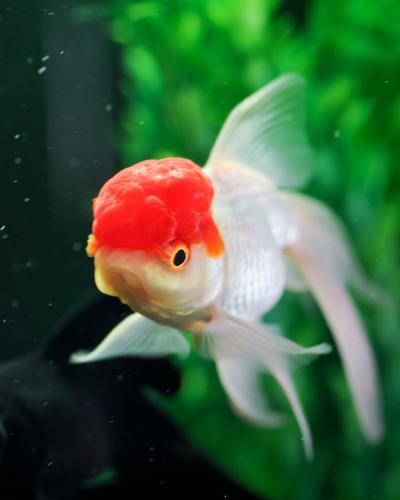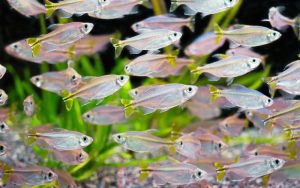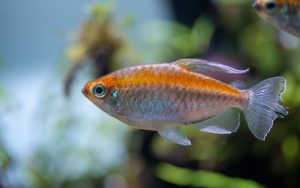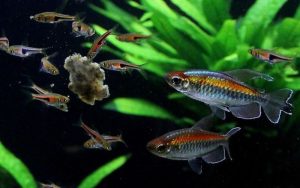Is your goldfish ignoring its meals, leaving you puzzled and concerned? It’s common for goldfish owners to face this issue and wonder, why is my goldfish not eating its food?
While goldfish are known for their healthy appetites, a sudden loss of interest in food can signal underlying problems that need your attention. Understanding these reasons is crucial to ensuring your pet stays happy, healthy, and thriving.
So, why is my goldfish won’t eat? From environmental stress to health issues, there are several potential causes for this worrisome behavior.
Sometimes, the solution is as simple as adjusting the tank conditions, but other times it could require medical intervention. Knowing how to spot the signs and address the problem is key to your goldfish’s well-being.
Stress in fish can be caused by a variety of things, like bullying, poor water quality, illness, inappropriate tank mates, and leaving the tank light on all the time.

By identifying these stressors and taking steps to alleviate them, you can help your goldfish regain its appetite and energy. Read on as we uncover the five hidden causes of appetite loss in goldfish and practical solutions to get them eating again!
Table of Contents
ToggleWhy Is My Goldfish Not Eating or Swimming?
Why are my Goldfish not eating in a tank or pond? There could be several reasons why your goldfish won’t eat. Here are some possible reasons:
5 Reasons for Your Goldfish Not Eating their Food
1. Stress and Environmental Factors
Stress is one of the most common reasons for a goldfish’s decreased appetite. Several environmental factors can contribute to stress, such as overcrowding, inadequate tank size, sudden changes in water parameters, or the presence of aggressive fish tank mates. These stressors can cause your Goldfish to feel anxious and reluctant to eat.
2. Poor Water Quality
Goldfish are highly sensitive to their aquatic environment, and poor water quality can significantly impact their appetite. High levels of ammonia, nitrites, or nitrates can harm your Goldfish and lead to a loss of appetite. Additionally, irregular water changes or the use of untreated tap water can introduce harmful substances and affect your Goldfish’s health.
3. Illness and Infections
When a goldfish is unwell or infected, it can decrease appetite. Common illnesses affecting Goldfish include bacterial or fungal infections, parasites, and viral diseases. If your Goldfish exhibits other signs of illness, such as unusual swimming patterns, lethargy, or physical abnormalities, it is crucial to seek veterinary care promptly; it seems like a swim bladder disorder.
4. Feeding Issues and Diet
Sometimes, the problem lies with the feeding routine or the type of food you offer to your Goldfish. Overfeeding might lead to digestive issues and loss of appetite. On the other hand, offering a monotonous diet without variety can make your Goldfish disinterested in eating. Goldfish are omnivorous and require a balanced diet of pellets and live or frozen foods.
5. New Environment and Adjustment Period
If you recently moved your Goldfish to a new tank or introduced it to a different environment, it may take some time for the fish to adjust. During this transition period, Goldfish might experience stress and temporarily lose appetite. Providing a calm and stable environment for your Goldfish is essential to help them acclimate and resume regular eating habits.
Solutions for a Goldfish Not Eating
Now that we have identified the possible causes for a gold fish not eating food let’s explore practical solutions to address each issue and encourage your Goldfish to regain its appetite.
– Assess and Address Stressors
If stress and environmental factors are contributing to your Goldfish’s decreased appetite, it’s crucial to identify and eliminate them. Ensure your Goldfish is in an appropriate-sized tank with plenty of swimming space. Avoid overcrowding and provide suitable hiding spots and decorations. If aggressive tank mates are causing stress, consider separating them or providing a more harmonious tank community.
– Maintain Optimal Water Quality
It’s essential to maintain optimal water quality. To promote a healthy appetite in your Goldfish, Regularly use a test kit for checking the water parameters such as ammonia, nitrites, nitrates, pH, and temperature. Perform regular water changes to keep these nitrate levels in check and remove accumulated toxins. Use a water conditioner to neutralize chlorine and other harmful substances when adding tap water.
– Monitor for Illness and Seek Veterinary Care
If other signs of illness accompany your Goldfish’s loss of appetite, it is crucial to monitor its behavior closely. Look for symptoms such as abnormal swimming patterns, discoloration, lesions, or fin deterioration. If you suspect your Goldfish is unwell, consult a veterinarian specializing in aquatic animals. They can diagnose and treat any underlying illnesses or infections.
– Adjust the Feeding Routine and Offer a Variety of Foods
Review your Goldfish’s feeding routine and make necessary adjustments. Avoid overfeeding, as it might lead to digestive problems and loss of appetite. Feed your fish small portions multiple times a day rather than a large amount simultaneously.
Additionally, provide a diverse diet that includes high-quality pellets, live or frozen foods like brine shrimp or bloodworms, and occasional treats such as peas. These varieties of goldfish food will stimulate your Goldfish’s interest in eating.
– Provide a Comfortable and Stable Environment
Ensure that your Goldfish’s environment is comfortable and stable. Maintain a consistent temperature, ideally between 68°F and 74°F (20°C and 23°C), depending on the fish species. Use a reliable heater and thermometer to regulate the water temperature. Keep the tank clean by regularly removing debris and maintaining proper filtration. A clean and well-maintained aquarium will promote a healthy appetite for your Goldfish.
What Actions Could you take if your Goldfish is not Eating?
If your Goldfish is not eating, there are several actions you can take to help them regain their appetite:
- 1. Check water quality: Poor water quality is a common reason for a goldfish to stop eating. Test the tank water for ammonia, nitrite, nitrate, and pH levels. Perform a partial water change to improve water quality if necessary.
- 2. Adjust feeding habits: Overfeeding or feeding the wrong type of food can cause digestive problems and loss of appetite. Feed your Goldfish a balanced diet that includes a variety of foods in small portions.
- 3. Monitor tank mates: Aggressive or territorial tank mates can stress out your Goldfish and cause them to stop eating. Consider separating aggressive fish or relocating your Goldfish to a different tank.
- 4. Observe your Goldfish’s behavior for signs of illness or injury. Look for physical symptoms such as white spots, red streaks, or swollen eyes. Consult with a veterinarian or aquatic specialist for diagnosis and treatment.
- 5. Try appetite stimulants: Some natural appetite stimulants include garlic, daphnia, and bloodworms. Try soaking their food in garlic juice or mixing it with a small amount of water to make it more appealing.
- 6. Be patient: Goldfish can stay healthy for several days without eating. Avoid force-feeding or overfeeding your Goldfish. Be patient and allow them feeding time to regain their appetite naturally.
Remember to continuously monitor your Goldfish’s behavior and seek veterinary advice if their loss of appetite persists or is accompanied by other symptoms.
How to Know that You Have Overfed your Goldfish?
To know if you’ve overfed your Goldfish, observe their behavior. If they eat their food quickly and then swim to the surface to hover, there’s likely too much food in the tank, leading to poor water quality due to excess waste.
Another sign is if excess food begins to float on the surface. If you notice your Goldfish not eating their food or acting lethargic, it could indicate that the oxygen levels are low. In extreme cases, overfeeding can cause health issues for the Goldfish, so avoiding it whenever possible is essential.
Goldfish Not Eating FAQs (Commonly Asked Questions)
Why is my Goldfish not eating food?
Why my goldfish not eating? There can be various reasons for a goldfish not being hungry, including stress, poor water quality, illness, feeding issues, or adjusting to a new environment.
How can I reduce stress for my Goldfish?
To reduce stress, ensure a suitable tank size, provide hiding spots, avoid overcrowding, and create a peaceful environment.
What should I do if my Gold fish is not eating due to poor water quality?
To address poor water quality, regularly test the water parameters, perform water changes, use a water conditioner, and maintain proper filtration to ensure a clean and healthy environment for your Goldfish.
Should I be concerned if my Goldfish stops eating?
Yes, a loss of appetite in Goldfish can indicate an underlying issue. Investigating the cause and taking appropriate measures is essential to ensure your Goldfish’s well-being.
How often should I feed my Goldfish?
Feeding your Goldfish in small portions multiple times a day is recommended. Avoid overfeeding, as it can lead to digestive problems and loss of appetite.
What are some suitable foods to offer my Goldfish?
A balanced diet for Goldfish includes high-quality pellets, frozen and live foods such as baby brine shrimp or bloodworms, and occasional treats like peas. Providing a variety of foods will help maintain your Goldfish’s interest in eating.
When should I seek veterinary care for my Goldfish?
If your Goldfish’s loss of appetite persists, or if it is accompanied by other concerning symptoms such as abnormal behavior, discoloration, or fin deterioration, it is advisable to consult a veterinarian who specializes in aquatic animals.
What should be your Goldfish’s usual diet?
Goldfish should get a balanced diet of pellets or flakes explicitly designed for their species. They can also be given occasional treats of live or frozen foods like worms or brine shrimp. It is essential to ensure that any food given to Goldfish sinks quickly to the bottom of the tank to prevent digestive issues and water pollution. Overfeeding must be avoided by following proper feeding guidelines for the fish food being used.
Can your Goldfish pass away without eating?
A goldfish can pass away without eating, especially if they go two weeks without food. While Goldfish without food can survive long periods, they may become weak and susceptible to diseases. Failure to provide food can also lead to starvation, causing organ damage and eventual death. It is essential to ensure that your Goldfish are fed regularly to maintain their health and longevity.
What are some possible reasons for a goldfish not eating?
Some of the most common reasons a goldfish may stop eating include changes in water conditions, stress, illness, overfeeding, or gut blockages.
Can a new goldfish be hesitant to eat?
New Goldfish can sometimes be hesitant to eat as they adjust to their new surroundings. They may need time to become comfortable and start feeding regularly.
What type of food should I be feeding my Goldfish?
Goldfish food is specially formulated to meet the nutritional needs of these fish. You can also treat them to small amounts of fresh vegetables or live food.
What should I do if my Goldfish is not eating?
Firstly, check the water conditions to ensure they are optimal for your Goldfish. Also, look for signs of illness like lethargy or abnormal swimming behavior. If you need more clarification, consult a vet specializing in fish.
Can a lack of appetite lead to stress in a goldfish?
Yes, if a goldfish is not eating, it can lead to stress. This can further compound the issue, as the fish may become more hesitant to eat. It is essential to address the issue as soon as possible and try to identify the underlying cause.
Is it possible for a goldfish to get sick after moving to a new tank?
Moving a goldfish to a new tank can be stressful and lead to illness. It is crucial to monitor your fish closely and provide them with optimal water conditions to minimize stress and the risk of illness.
Can overfeeding my Goldfish lead to a loss of appetite?
Yes, overfeeding can lead to a loss of appetite. This can be due to the fish feeling full and not wanting to eat or to digestive issues caused by overeating.
What should I do if my Goldfish is not eating anything at all?
If your Goldfish eats nothing, it could indicate illness or gut blockage. It is significant to seek professional advice from a vet specializing in fish.
Can algae in my goldfish tank cause them to stop eating?
Algae in your goldfish tank are not necessarily harmful, but they can cause issues with water quality. Poor tank water quality can lead to stress and illness, which could cause your Goldfish to stop eating. You should regularly check the water conditions and clean the tank to avoid these issues.
Can I give my Goldfish different types of food?
Yes, Goldfish can be given different types of food as long as it is appropriate for their species and nutritional requirements. Variety is always good, as it can prevent your fish from becoming bored with a single type of food.
Why is my new goldfish not eating?
Why isn’t my goldfish eating? New goldfish may take time to acclimate. Check water parameters, offer varied diet, and ensure a quiet environment. If problem persists, consult a vet for further guidance.
Why does my goldfish hiding and not eating?
why my goldfish is not eating food and hide? Goldfish may hide and not eat due to stress, poor water quality, illness, or changing environment. Monitor conditions, provide a varied diet, and seek veterinary advice if behavior persists.
Conclusion
So, why wont my Goldfish eat their food? In conclusion, several hidden causes can contribute to a goldfish’s loss of appetite. By understanding these factors and implementing appropriate solutions, you can help your Goldfish regain its appetite and maintain good health. Addressing stressors, maintaining optimal water quality, monitoring for illnesses, adjusting the feeding routine, and providing a comfortable environment are vital steps in ensuring your Goldfish eats well and thrives.
By following these guidelines and addressing the specific causes of your Goldfish’s loss of appetite, you can help your pet regain healthy eating habits and ensure its overall well-being. Remember to provide a stress-free environment, maintain optimal water quality, offer a varied diet, and seek professional advice when necessary. Your Goldfish will thrive and bring joy to your aquarium once again.
Disclaimer: This Ultimate post about “why won’t my goldfish eat” is for informational purposes only and should not replace pro-veterinary advice. If you have specific concerns about your Goldfish’s health, please consult a qualified veterinarian.
You might also like
- 7 Compatible Goldfish Companions That Don’t Eat Each Other!
- Can You Put Cory Catfish with Goldfish: 7 Vital Tips for Success
- Can Two Goldfish Live Together in a Bowl: The Shocking Truth
- Why Do Goldfish Chase Each Other: (5 Causes & Solutions)
- Goldfish Garden Breeding Pond: 7 Essential Tips for a Stunning Pond
- Goldfish Breeding Size: 5 Secrets to Bigger Broods (Solved)
- Can You Eat Giant Goldfish: 5 Shocking Reasons You Shouldn’t Do
- How Big Do Comet Goldfish Have to Be to Breed: (A Detailed Answer)
- Can My Goldfish Die from Swim Bladder Disease: (Solved)
- Goldfish Illnesses: 10 Quick Fixes for Your Sick Goldfish!
- Fantail Goldfish Sick Symptoms: (5 Critical Signs Revealed)




